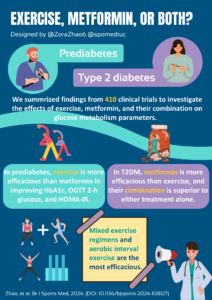Keywords: Exercise, Diabetes mellitus, Prediabetes
This blog provides a summary of a recent study published in BJSM (1).
Why is this study important?
Diabetes is one of the most common chronic diseases, and around one-tenth of the world’s population lives with this condition (2). Metformin and exercise training are both considered first-line treatments for type 2 diabetes mellitus (T2DM) (3, 4) and have been shown to be effective in preventing diabetes in some prediabetes trials (5). However, several questions remain in terms of exercise and metformin treatments in individuals with prediabetes and T2DM:
- Is exercise as efficacious as metformin in improving glucose metabolism?
- Which type of exercise is most efficacious?
- Is the combination of exercise and metformin more efficacious than each treatment alone?
How did the study go about this?
We used a systematic review and network meta-analysis to provide a holistic synthesis of the role of exercise, metformin and their combination for indices related to glucose metabolism (i.e., haemoglobin A1c (HbA1c), 2-hour glucose during oral glucose tolerance test (OGTT), fasting glucose, fasting insulin and homeostasis model assessment of insulin resistance (HOMA- IR)) in individuals with prediabetes and T2DM. A total of 410 randomised controlled trials (RCTs) with 33,802 participants were included in our study.
What did the study find?
In prediabetes, the exercise showed greater efficacy than metformin on HbA1c levels, 2-hour glucose and HOMA-IR, while the efficacy on fasting glucose was comparable.
In T2DM, metformin was more efficacious than exercise on HbA1c, 2-hour glucose and fasting glucose; exercise + metformin showed greater efficacy in improving HbA1c and fasting glucose than each treatment alone.
We further categorised the exercise intervention into six types (i.e., aerobic continuous exercise, aerobic interval exercise, resistance exercise, mind-body exercise, mixed exercise regimens and other exercises). The ranking indicated aerobic interval exercise and mixed exercise regimens appear to be most efficacious for improving glucose metabolism.
What are the key take-home points?
Overall, this study answered the initially posed research questions:
- Metformin seems more efficacious than exercise in T2DM; however, exercise appears to be more efficacious than metformin in individuals with prediabetes.
- Concerning the exercise modalities, aerobic interval exercise and exercise regimens combining various modalities appear to be most efficacious for improving glucose metabolism.
- Exercise + metformin showed greater efficacy in glucose metabolism than each treatment alone, especially in T2DM, and the efficacy may depend on the specific exercise modalities.
Our findings may provide a foundation to further enhance clinical guidelines for both pharmaceutical and non-pharmaceutical first-line treatments of pre-diabetes and T2DM.

References:
- Zhao T, Yang Q, Feuerbacher JF, et al. Effects of exercise, metformin and their combination on glucose metabolism in individuals with abnormal glycaemic control: a systematic review and network meta-analysis. Br J Sports Med Published Online First: 06 September 2024. doi: 10.1136/bjsports-2024-108127
- Saeedi P, Petersohn I, Salpea P, et al. Global and regional diabetes prevalence estimates for 2019 and projections for 2030 and 2045: Results from the International Diabetes Federation Diabetes Atlas, 9th edition. Diabetes Res Clin Pract 2019;157:107843.
- American Diabetes Association. 9. Pharmacologic Approaches to Glycemic Treatment: Standards of Medical Care in Diabetes—2020. Diabetes Care 2020;43:S98–110.
- Davies MJ, Aroda VR, Collins BS, et al. Management of Hyperglycemia in Type 2 Diabetes, 2022. A Consensus Report by the American Diabetes Association (ADA) and the European Association for the Study of Diabetes (EASD). Diabetes Care 2022;45:2753–86.
- American Diabetes Association. 3. Prevention or Delay of Type 2 Diabetes: Standards of Medical Care in Diabetes—2020. Diabetes Care 2020;43:S32–6.
Authors: Tong Zhao, Joshua F. Feuerbacher, Moritz Schumann